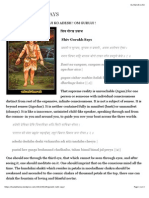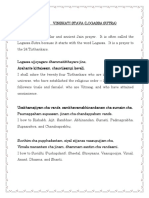0 ratings0% found this document useful (0 votes)
1K viewsHeart Sutra - Lyrics Sanskrit
Heart Sutra - Lyrics Sanskrit
Uploaded by
RosThe Prajnaparamita Hridaya Sutra is a Mahayana Buddhist text that describes emptiness (shunyata). It states that all phenomena (forms, feelings, perceptions, mental formations, and consciousness) are empty of inherent existence or nature. It further explains that all dharmas are marked by the characteristics of emptiness - they are unproduced, unceasing, immaculate, and complete. Since all things are without inherent existence or nature, there is ultimately no eye, ear, nose, tongue, body, or mind. The sutra concludes by stating that through relying on and comprehending emptiness via prajnaparamita, bodhisatt
Copyright:
© All Rights Reserved
Available Formats
Download as DOC, PDF, TXT or read online from Scribd
Heart Sutra - Lyrics Sanskrit
Heart Sutra - Lyrics Sanskrit
Uploaded by
Ros0 ratings0% found this document useful (0 votes)
1K views1 pageThe Prajnaparamita Hridaya Sutra is a Mahayana Buddhist text that describes emptiness (shunyata). It states that all phenomena (forms, feelings, perceptions, mental formations, and consciousness) are empty of inherent existence or nature. It further explains that all dharmas are marked by the characteristics of emptiness - they are unproduced, unceasing, immaculate, and complete. Since all things are without inherent existence or nature, there is ultimately no eye, ear, nose, tongue, body, or mind. The sutra concludes by stating that through relying on and comprehending emptiness via prajnaparamita, bodhisatt
Original Description:
Heart sutra in sanskrit
Original Title
Heart Sutra- Lyrics Sanskrit
Copyright
© © All Rights Reserved
Available Formats
DOC, PDF, TXT or read online from Scribd
Share this document
Did you find this document useful?
Is this content inappropriate?
The Prajnaparamita Hridaya Sutra is a Mahayana Buddhist text that describes emptiness (shunyata). It states that all phenomena (forms, feelings, perceptions, mental formations, and consciousness) are empty of inherent existence or nature. It further explains that all dharmas are marked by the characteristics of emptiness - they are unproduced, unceasing, immaculate, and complete. Since all things are without inherent existence or nature, there is ultimately no eye, ear, nose, tongue, body, or mind. The sutra concludes by stating that through relying on and comprehending emptiness via prajnaparamita, bodhisatt
Copyright:
© All Rights Reserved
Available Formats
Download as DOC, PDF, TXT or read online from Scribd
Download as doc, pdf, or txt
0 ratings0% found this document useful (0 votes)
1K views1 pageHeart Sutra - Lyrics Sanskrit
Heart Sutra - Lyrics Sanskrit
Uploaded by
RosThe Prajnaparamita Hridaya Sutra is a Mahayana Buddhist text that describes emptiness (shunyata). It states that all phenomena (forms, feelings, perceptions, mental formations, and consciousness) are empty of inherent existence or nature. It further explains that all dharmas are marked by the characteristics of emptiness - they are unproduced, unceasing, immaculate, and complete. Since all things are without inherent existence or nature, there is ultimately no eye, ear, nose, tongue, body, or mind. The sutra concludes by stating that through relying on and comprehending emptiness via prajnaparamita, bodhisatt
Copyright:
© All Rights Reserved
Available Formats
Download as DOC, PDF, TXT or read online from Scribd
Download as doc, pdf, or txt
You are on page 1of 1
http://www.dharmabliss.org/audio/heart-skt-audiotext.
html
Prajnaparamita Hridaya Sutra - romanized Sanskrit
arya-avalokitesvaro bodhisattvo gambhiram prajnaparamitacaryam
caramano
vyavalokayati sma: panca-skandhas tams ca svabhavasunyan
pasyati sma
iha sariputra rupam sunyata sunyataiva rupam, rupan na prithak
sunyata
sunyataya na prithag rupam, yad rupam sa sunyata ya sunyata tad
rupam;
evam eva vedana-samjna-samskara-vijnanam.
iha sariputra sarva-dharmah sunyata-laksala, anutpanna aniruddha,
amala
avimala, anuna aparipurnah.
tasmac Sariputra sunyatayam na rupam na vedana na samjna na
samskarah
na vijnanam. na caksuh-srotra-ghrana-jihva-kaya-manamsi. na
rupa-sabda-gandha-rasa-sprastavya-dharmah. na caksur-dhatur
yavan na
manovijnana-dhatuh. na-avidya na-avidya-ksayo yavan na
jaramaranam na
jara-marana-ksayo. na duhkha-samudaya-nirodha-marga. na
jnanam, na
praptir na-apraptih.
tasmac Sariputra apraptitvad bodhisattvasya prajnaparamitam
asritya
vibaraty acittavaranah. cittavarana-nastitvad atrasto
viparyasa-ati-kranto nistha-nirvana-praptah.
tryadhva-vyavasthitah sarva-buddhah prajnaparamitam asritya-
anut-taram
samyaksambodhim abhisambuddhah.
tasmaj jnatavyam: prajnaparamita maha-mantro mahavidya-mantro
'nuttara-mantro samasama-mantrah, sarva-duhkha-prasamanah,
satyam
amithyatvat. prajnaparamitayam ukto mantrah. tadyatha:
gate gate paragate parasamgate bodhi svaha!
(iti prajnaparamita-hridayam sa-maptam)
You might also like
- Narasimha Dwadasa Nama StotramDocument1 pageNarasimha Dwadasa Nama StotramC.prassanna Sai RaghavendraNo ratings yet
- Ganesa Atharva Seersha UpanishadDocument5 pagesGanesa Atharva Seersha Upanishadveekayg3651No ratings yet
- Bhagavad Gita SaramDocument14 pagesBhagavad Gita Saramdeepaksubsmani@yahoo.com100% (1)
- Syllabus Third BAMS KAYACHIKITSA PDFDocument23 pagesSyllabus Third BAMS KAYACHIKITSA PDFDr.sharmilaNo ratings yet
- Sudarshana KavasamDocument7 pagesSudarshana Kavasamitell_sri100% (1)
- The High King Avalokitesvara Sutra PDFDocument7 pagesThe High King Avalokitesvara Sutra PDFMichael0% (1)
- Ye Dharmā HetuprabhavaDocument3 pagesYe Dharmā HetuprabhavaProkhor PetrovNo ratings yet
- Avalokiteshvara Simhanada Visualization Mantras A5Document1 pageAvalokiteshvara Simhanada Visualization Mantras A5Om Ah Hung ChenNo ratings yet
- Heart Sutra Sanskrit EnglishDocument2 pagesHeart Sutra Sanskrit EnglishlovablesagiNo ratings yet
- Chittamani Tara Retreat Sadhana c5Document83 pagesChittamani Tara Retreat Sadhana c5Ioana KamiNo ratings yet
- Ganpati StotraDocument1 pageGanpati StotraShashank ShekharNo ratings yet
- Jiva Goswami Sankalpa KalpadrumaDocument172 pagesJiva Goswami Sankalpa KalpadrumaAnonymous xBFDtuNo ratings yet
- Guhyakali Upanishad (Secret Upanishads)Document12 pagesGuhyakali Upanishad (Secret Upanishads)sriramtheatmanNo ratings yet
- Saint Jnana SambandarDocument8 pagesSaint Jnana SambandarSivasonNo ratings yet
- Sri Nrisimha PranamaDocument11 pagesSri Nrisimha PranamaGanesh Kumar MadhavapeddiNo ratings yet
- SHANKER THAPA's Recognition of Mahapratisara in Different Buddhist TraditionsDocument7 pagesSHANKER THAPA's Recognition of Mahapratisara in Different Buddhist TraditionsShankerThapa100% (1)
- Part 7 Sri Tara Devi - Pitha NyasaDocument6 pagesPart 7 Sri Tara Devi - Pitha NyasaJacob HoyNo ratings yet
- NamastakamDocument2 pagesNamastakamMani Gopal DasNo ratings yet
- Shiva 1000 Name With MeaningsDocument55 pagesShiva 1000 Name With Meaningsviky24No ratings yet
- VajrapaniDocument4 pagesVajrapaniАлексей ШевченкоNo ratings yet
- Jitante - Vol1Document120 pagesJitante - Vol1kiranchakri100% (1)
- Mahakarmabhivanga SutraDocument7 pagesMahakarmabhivanga SutramundakasamanakaNo ratings yet
- Gorakh Nath SaysDocument3 pagesGorakh Nath Saysamnotaname4522No ratings yet
- Grahamatrka Nama DharaniDocument1 pageGrahamatrka Nama DharanisandkornimwindNo ratings yet
- Vajrasattva MantraDocument2 pagesVajrasattva MantrashtrumtNo ratings yet
- Logassa MeaningDocument2 pagesLogassa MeaningveyumubNo ratings yet
- Prayers From Taittiriya UpanishadDocument8 pagesPrayers From Taittiriya Upanishadpassion26No ratings yet
- Index php-1Document2 pagesIndex php-1shivaNo ratings yet
- Ushus K Unnikrishnan Part I Chapter IDocument44 pagesUshus K Unnikrishnan Part I Chapter ItamilNo ratings yet
- समासचक्र dr dhaval patelDocument41 pagesसमासचक्र dr dhaval patelMukeshPatel100% (2)
- Mantra of AvalokiteshvaraDocument1 pageMantra of Avalokiteshvarayuuudiii100% (1)
- Devi Atharvashirsha EnglishDocument3 pagesDevi Atharvashirsha EnglishPraveen SmartNo ratings yet
- A Dunhuang Phurpa Consecration Rite PDFDocument32 pagesA Dunhuang Phurpa Consecration Rite PDFVasso MamaliNo ratings yet
- Abhinavagupta - Tantrasara - Roman TransliterationDocument68 pagesAbhinavagupta - Tantrasara - Roman TransliterationflorinhanganNo ratings yet
- Shiv ADocument3 pagesShiv AanandaleoneNo ratings yet
- Amoghapāśakalparāja Part ViiDocument34 pagesAmoghapāśakalparāja Part Viiwenzhuo zhang0% (1)
- KTR Graz Tenfold Powerfuld Kalachakra MantraDocument2 pagesKTR Graz Tenfold Powerfuld Kalachakra Mantraalbertmelondi100% (1)
- Toh544 - 84000 The Tantra of SiddhaikaviraDocument61 pagesToh544 - 84000 The Tantra of SiddhaikaviraAndre HscNo ratings yet
- Mahalakshmi Sri Chakra PujaDocument8 pagesMahalakshmi Sri Chakra PujaganeshNo ratings yet
- Shrutiand SmritiDocument9 pagesShrutiand SmritiAntara MitraNo ratings yet
- Tulku TsuloDocument1 pageTulku TsulodrubtobNo ratings yet
- Mantra Pushpam (IAST)Document4 pagesMantra Pushpam (IAST)OmkaarnathNo ratings yet
- Lalitha Sahasranama Stotram PDFDocument5 pagesLalitha Sahasranama Stotram PDFSundar SyamNo ratings yet
- UntitledDocument11 pagesUntitledrameshk01965No ratings yet
- NagunniDocument6 pagesNagunnimayank.sharmaNo ratings yet
- Sri Mayavada-Sata-DushaniDocument11 pagesSri Mayavada-Sata-DushaniDavor VeseljkoNo ratings yet
- Mumukshupadi Part 1 PDFDocument50 pagesMumukshupadi Part 1 PDFenota15No ratings yet
- Siddha Kunjika Stotram Eng v1Document2 pagesSiddha Kunjika Stotram Eng v1Kundan KumarNo ratings yet
- Karmapa Marriage - Sabchu RinpocheDocument4 pagesKarmapa Marriage - Sabchu RinpochericojimiNo ratings yet
- Hanuman Darshan Hetu MantraDocument1 pageHanuman Darshan Hetu Mantranaresh.sagar321No ratings yet
- ShatangayurmantrahDocument3 pagesShatangayurmantrahExcelNo ratings yet
- Venkatesha Part 1Document31 pagesVenkatesha Part 1Sarva Vidya PeethamNo ratings yet
- AYR190 - Review For CAT Only - 02 14 2008 - Rev 24Document140 pagesAYR190 - Review For CAT Only - 02 14 2008 - Rev 24Ruth Viotti SaldanhaNo ratings yet



























































